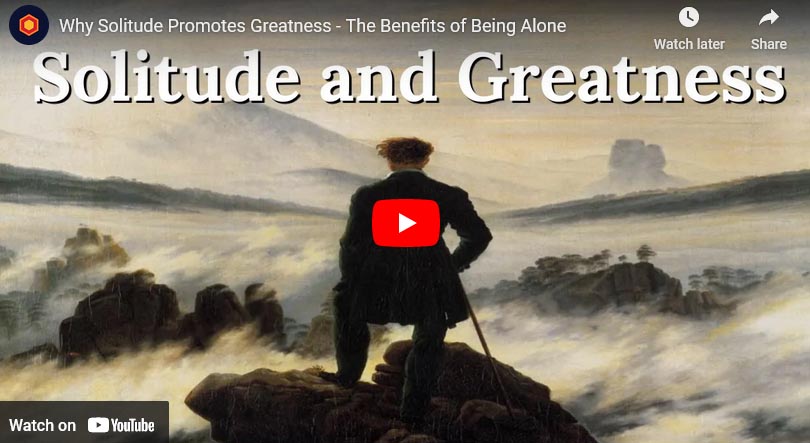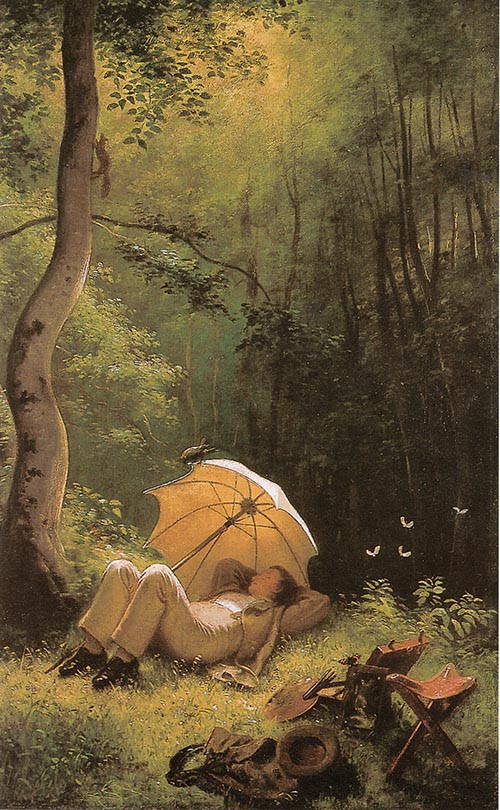Why Solitude Promotes Greatness –
The Benefits of Being Alone
The following is a transcript of this video.
“To live alone one must be either a beast or a god, says Aristotle. Leaving out the third case: one must be both…”
Nietzsche, Twilight of the Idols
According to a 2010 study published in the journal PLOS Medicine, the health risks of chronic loneliness are equivalent to smoking 15 cigarettes a day. To mitigate the harms of loneliness, we can increase our social connectedness, but we can also improve our capacity to be alone. For not all who are alone are lonely. Regarding his extended time spent alone at Walden Pond, the philosopher Henry David Thoreau proclaimed:
“I am never lonely here…I never found the companion that was so companionable as solitude.”
Henry David Thoreau, Walden
In this video, we explore the virtues of solitude and examine why, far from being damaging to health as is loneliness, solitude promotes self-development, creates conditions of unparalleled freedom, cures many mental health problems, and is necessary for the cultivation of a great character.
“Loneliness is one thing, solitude another: you have learned that – now!”
Nietzsche, Thus Spoke Zarathustra
In his book Solitude: A Philosophical Encounter, the philosopher Philip Koch defines solitude as “a stretch of experience disengaged from other people in perception, thought, emotion, and action…Solitude is…simply an experiential world in which other people are absent: that is enough for solitude, that is constant through all solitudes.”
Many of the towering figures of history ascended to their legendary status by harnessing the benefits found in long stretches of solitude. The 40 days and nights Jesus spent wrestling with the devil in the desert spurred him to his spiritual heights. Lao Tzu, Buddha, and Moses found in solitude the great moral visions which defined their lives. Marcus Aurelius, Friedrich Nietzsche, Ralph Waldo Emerson, Albert Camus, Henry David Thoreau, and many other philosophers, sought in solitude a sanctuary to cultivate their character and develop their philosophical insights away from the corrupting influence of society. Nietzsche, for example, wrote that:
“When I am among the many I live as the many do, and I do not think as I really think; after a time it always seems as though they want to banish me from myself and rob me of my soul…I then require the desert, so as to grow good again.”
Nietzsche, Daybreak
Admiral Richard Byrd spent a winter alone in the Antarctic where he endured brutal cold, long black nights, and in his words, “an isolation which no power on earth could lift for at least six months.” But rather than being lonely this intense period of solitude was the most transformative of his life, for as he wrote in his book Alone:
“Yes, solitude is greater than I anticipated. My sense of values is changing, and many things which before were in solution in my mind now seem to be crystallizing.”
Richard Byrd, Alone
Why do some individuals thrive in solitude, while others suffer under the weight of loneliness? Simply put, the lonely are ignorant of the great virtues of solitude or do not know how to harness them. And foremost among the virtues of solitude is the freedom to discover who we are and to become that person. Or as the philosopher Arthur Schopenhauer observed:
“A man can be himself only so long as he is alone; and if he does not love solitude, he will not love freedom; for it is only when he is alone that he is really free. Constraint is always present in society, like a companion of whom there is no riddance; and in proportion to the greatness of a man’s individuality, it will be hard for him to bear the sacrifices which all intercourse with others demands.”
Arthur Schopenhauer, Essays and Aphorisms
To grasp the freedom which solitude offers, we can dwell on the constraints present in social engagements. Friends, family, and romantic partners are important ingredients in a good life, but they also represent what Philip Koch called “structures of demands”: “demands to be listened to with an interest commensurate with their expectations, cared for according to their requirements, followed or led along the trail at their own pace.” Moreover, the emotional state of others constrains our experience. When others are cheerful it lifts us up, but a bad mood often brings us down. In either case, our emotional state is not autonomous but dependent on the people around us. Or as R.D. Laing writes:
“They are not having fun. I can’t have fun if they don’t. If I can get them to have fun, then I can have fun with them. Getting them to have fun, is not fun. It is hard work.”
R.D. Laing, Knots
Even strangers constrain our experience. The philosopher Jean-Paul Sartre tells us to imagine ourselves alone in a park. We are enjoying our experience of the trees, the sun, and the birds – they exist for us alone. But then another individual sits on the bench across from us. We become aware that we are now an object in someone else’s consciousness, and this disrupts our idyllic communion with the environment. In an analogous manner, the psychologist William James pointed out the disappointing feeling that comes upon a solitary hiker when he sees another hiker approach in the distance. He immediately feels more self-conscious and less free, less able to simply be. This is what Sartre meant by the phrase “Hell is other people.” Or as Sartre wrote:
“By the mere appearance of the Other, I am put in the position of passing judgement on myself as an object, for it is as an object that I appear to the Other.”
Jean-Paul Sartre, Being and Nothingness
All these constraints are absent in solitude. For solitude is characterized by unrestraint and a freedom that is inaccessible in social engagement. In solitude we are free to enjoy our surroundings without the disrupting awareness that we are an object in someone else’s perceptual field. We are free to do what we want when we want. We can think or feel anything and follow our passions with no concern for what others will think of us or whether we are meeting their expectations or demands. “Free! It feels strange at first, no one bounding you on any side.” (Philip Koch, Solitude: A Philosophical Encounter) The English philosopher William Hazlitt made a habit of going on long walks alone, simply to enjoy the freedom of solitude, and as he noted:
“The soul of a [solitary] journey is liberty, perfect liberty, to think, feel, do, just as one pleases. . . For once, I like to have it all my own way; and this is impossible unless you are alone.”
William Hazlitt, Table Talk
Or as Philip Koch observed:
“Thoreau remarked, “I go and come with a strange liberty in nature.” So true, but why? An obvious point is the escape from the social controls which govern all interpersonal life: in solitude you can cry “Fire!” anytime you like, and you can do it stark naked…Certainly freedom of movement is a universal metaphor for the spiritual freedom of solitude, where our spirits wander or ramble or leap or soar.”
Philip Koch, Solitude: A Philosophical Encounter
The freedom of solitude is valuable for its own sake; but also as a means to self-discovery and personal growth. For when alone and absent the social constraints that bound our experience, we can engage in what Philip Koch called “attunement to self”. Or as he explained:
“…attunement to self is best characterized by the image of free flow, the flowing into [awareness] of thoughts, desires, and emotions with no sense of censorship or management, together with a free-flowing access backwards towards their origins.”
Philip Koch, Solitude: A Philosophical Encounter
Opening ourselves up to the full range of our emotions, thoughts, desires, and inner images, puts us in touch with aspects of our selfhood that we bury beneath the social masks we wear when around others. But in solitude we are free to take off these masks, as there is no one to listen to or answer to but the voice of our conscience. After a long and difficult relationship, the novelist May Sarton spent extended time in total solitude, and as she wrote in Journal of a Solitude:
“I begin to have intimations, now, of a return to some deep self that has been too absorbed and too battered to function for a long time.”
May Sarton, Journal of a Solitude
Or as the American philosopher Thomas Merton echoed in The Silent Life:
“Not all men are called to be hermits, but all men need enough silence and solitude in their lives to enable the deep inner voice of their own true self to be heard at least occasionally. When that inner voice is not heard…life is always miserable and exhausting… If man is constantly exiled from his own home, locked out of his own spiritual solitude, he ceases to be a true person. He no longer lives as a man.”
Thomas Merton, The Silent Life
The voices we hear in solitude, however, are not always pleasant. Sometimes an attunement to self involves the re-living of past traumas, and the emergence of painful emotions, fears, and anxieties we have been avoiding by immersing ourselves in the distractions of society.
“This state of inner attunement is not always joyful or serene…Sometimes it involves feeling with devastating intensity the conflicts, the rages, the intimations of mortality we have been trying to deny… Yearnings, rages, jealousies, dependencies, and estrangements can be safely lived through when the persons upon whom we might wrongly (or dangerously, or foolishly) unleash them are absent.”
Philip Koch, Solitude: A Philosophical Encounter
While the conflicts and emotions that emerge in solitude can cause suffering, their surfacing gives us the chance to consciously confront them. And if we use this opportunity to sit in silence and allow our anxieties and distressing emotions to wash over us, we can process, resolve, release them, and heal the chronic mental health problems they were generating. And as Albert Camus observed:
“When a man has learned – and not on paper – how to remain alone with his suffering, how to overcome his longing to flee, then he has little left to learn.”
Albert Camus, Notebooks 1935-1951
This healing power of solitude is not hyperbole. The Japanese physician Shoma Morita developed a form of psychotherapy, based on the principles of Zen Buddhism, which forgoes therapeutic and pharmaceutical intervention in favor of providing the patient an environment of solitude where he is forced to confront the suffering he has been avoiding. Or as Ilsa Veith explains:
“Upon his arrival at the hospital, the neurotic patient…must have complete bed rest for up to a week. During this time he is not permitted to associate with anyone else. He must not read or write, smoke, telephone, listen to the radio, or watch television. The patient is left alone with his illness until he and his illness become one—he has to accept his illness in complete solitude.”
Ilsa Veith, Hermits and Recluses
Most cultures of the past were aware of the great virtues of solitude, and in some solitude was valued even more than sociality. Among the Tarahumara Indians of the Sierra Madre in Mexico, the Professor J. Ralph Audy noted “almost a cult of solitude”. And as he continues:
“A little boy of six may take his ration of pinole [corn ground into a powder] and disappear with the sheep for one or two weeks without seeing a single other person before he returns…these Indians are so accustomed to leading solitary lives that they feel embarrassed and at a loss when called on to converse with others.”
J. Ralph Audy, Man the Lonely Animal
Even in cultures where the living was more communal, individuals went into extended periods of solitude to facilitate major life transitions. For example, solitary quests were an integral part of the rites of passage through which an adolescent boy transitioned to manhood. In a rite of passage, a boy was taken to a secluded camp in the wilderness. There he remained alone, sometimes for months. Anything he needed to survive he made or found himself. He hunted, foraged, protected himself from predators, and faced his fear of the unknown and of the darkness. He underwent an attunement to self and confronted and surmounted his loneliness, anxieties, dependencies, and transformed his mind from an unruly enemy into a trusted friend. Only those who succeeded in this solitary quest were considered by the community to be “real men”. And as James Hollis writes:
“Ritual isolation is an introduction to a central truth, that no matter how tribal our social life, we are on the journey alone and must learn to draw strength and solace from within….[The boy] learned to depend on his wits, his courage and his weapons, or he perished.”
James Hollis, Under Saturn’s Shadow
Culturally sanctioned solitary quests have been common in every known culture throughout history, except ours. This reflects our society’s deep aversion to solitude. Instead of being seen as a precious gift, many see solitude as something to be endured in between social engagements or relationships. Or worse, solitude is seen as something to be evaded. When other people are not present, most of us stare at screens to distract ourselves from our aloneness and the voices we might hear in the silence. Perhaps this collective flight from solitude is the reason why mental illness and weakness are the new norm. For as the 17th century philosopher Blaise Pascal observed:
“All of humanity’s problems stem from man’s inability to sit quietly in a room alone.”
Blaise Pascal, Pensées
Art Used in this Video



 academyofideas.com
academyofideas.com

















